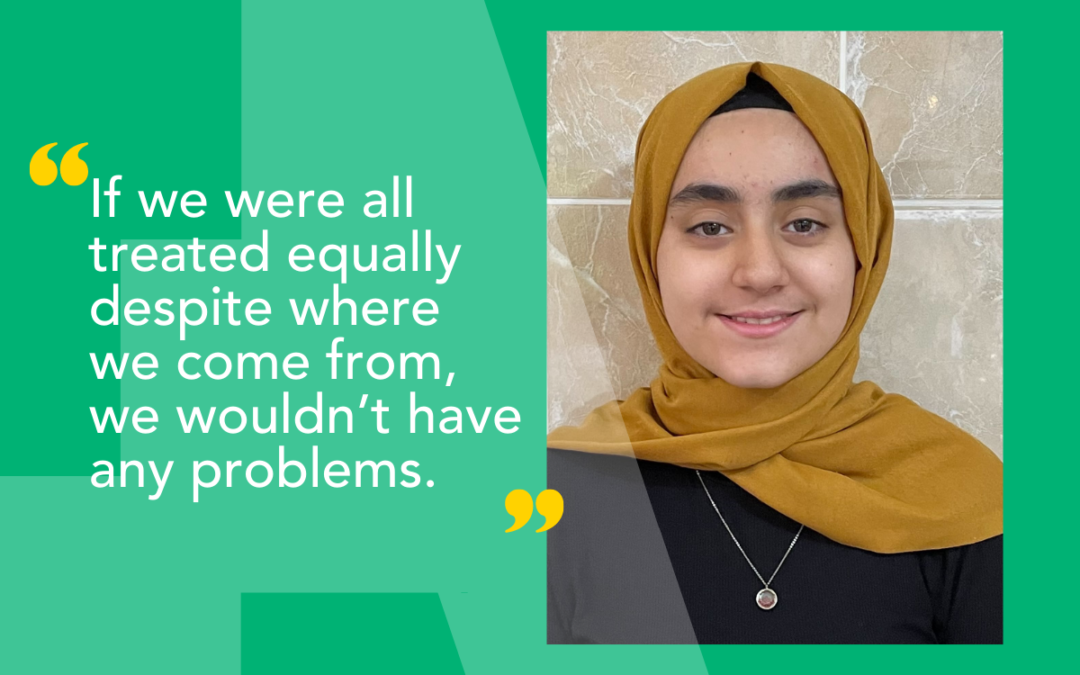Ceydanur (15) from Oasis Academy Hadley has been selected as the winner of The Access Project and Penguin’s Cut Short writing competition. Ceydanur beat tough competition and was selected by Cut Short author and former The Access Project mentor Ciaran Thapar.
The Cut Short writing competition
Cut Short: Youth Violence, Loss and Hope in the City is a new book by author Ciaran Thapar. Ciaran once worked as a The Access Project mentor. The book also details the experiences of one of our former students, Demetri.
Ciaran draws on what he has seen as a youth worker and mentor, breaking down the many complex issues and realities of London’s youth violence crisis today. The book encapsulates a lot of the challenges the young people we work with face.
To celebrate the launch of Cut Short, we launched a writing competition with the book’s publishers Penguin in late July. Students were asked to share what they would do if they ruled the world – a theme that features heavily in the book. The competition was judged by both Ciaran and his Penguin editors.
Selecting the winner of the Cut Short writing competition
The Access Project students from across the country entered the competition. Penguin editors shortlisted four students that author Ciaran Thapar had to choose from – Aishah (15) from Ormiston Forge Academy, Jashan (17) from Ashfield School, Swedel (15) from St George’s Roman Catholic School and Ceydanur (15) from Oasis Academy Hadley.
Amelia Fairney from Penguin said: “It was a joy to read these lively, thoughtful and extremely well written entries. I felt the final four really showcased an exciting breadth of different views of the world while demonstrating key creative writing skills of vivid description, humour and persuasion. It wouldn’t surprise me if there are some future writers for Penguin to publish among them.”
Ciaran Thapar read all of the shortlisted students and selected Ceydanur Cokgezici as the winner. Speaking about the winning piece, Ciaran said: “All four were fantastic and so this was a very hard decision. But I went for Ceydanur Cokgezici as the winner. All four are passionate, intellectual, fair and beautifully written, but I felt that Ceydanur’s strikes the best balance of being practical and poetic. Well done to Ceydanur, the runners up and everyone who participated. Reading these filled me with optimism about the next generation and what they can achieve.”
Ceydanur was very pleased to be selected as the winner of the Cut Short writing competition, and has won a box of Penguin books as a prize. She said: “I liked outlining the key issues in our society and how we can start to fix them. It made me realise that there is so much to improve. When I took a moment to think about our issues in the world, I realised it is all about equality. Poverty is unequal – it is about not diffusing the resources properly. Discrimination is unequal too. If we were all treated equally despite where we come from, we wouldn’t have any problems.”
Her piece about ruling the word focused on bringing about an end to inequality. You can read the full piece below.
Here is Ceydanur’s winning piece titled, If I were to rule the word.
With such a hypothetical question, you inevitably ask yourself, what would differentiate myself from others who have previously attempted to rule the world; their dogmas or attitudes, or priorities and perspectives? What would stop the corruption of such power? To that I say: the solution is the consistent use of your moral compass, with ethical considerations intertwined in every decision. Consequently, if ruled the world, I’d focus on eliminating the root of suffering and injustice: inequality.
More specifically, every global problem we can think of, is based around inequality. For example, poverty is the result of unequal distribution of resources within society. To try and eliminate this issue, I would establish certain statistics of how an average country should economically look like and make this a target by 2031. Subsequently, this would involve taxes paid by other countries to ensure financial security globally. Moreover, extra funds would help lower income countries meet health and sanitary requirements to enhance life expectancy and child mortality rates. No matter where you are from, you would be able to access a high standard of healthcare and more work would be available to maximise employment, thus better living standards.
Other issues that I would address that heavily revolves around inequality is discrimination. In many countries, we are legally equal, however not treated as such by individuals. Therefore, I would arrange many sessions with the younger generations which would amplify that cultural, religious or racial differences should not lead to discrimination, as targeting from young age most likely prevents future hate crimes. Consequently, everyone would be treated equally despite, race, social status and religious biases. Moreover, I would pursue gender equality, especially in workplaces and in terms of salary, and establish equal rights for both sexes and preserve the consistency of the human rights policy across countries. If I was to rule the world, it would be one where you could walk out of the door with your individuality and free expression without fear of prejudice and harm; a society where instead of changing for the world, the world changes its standards and judgments against you.
Pursuing this further, another issue I am really passionate about is the inequality in war and the ever-lasting effect this has on children. As societies most vulnerable, children must be provided a healthy and stimulating environment to grow up in and the consequences of war hinders that future. For that reason, if I could get my voice heard ,I would encourage people to settle disputes and wars , so money can be spent elsewhere, such as in healthcare or education. Finally, education would be accessible for both girls and boys and it would be high quality across all countries, not just the Western world. Inequality in education limits the true capacity of children and steals their potential and benefit to our world.
Subsequently, to perfect our world image and create better social constructs, we need to stop allowing our borders and differences blur the truth that we are a whole.

